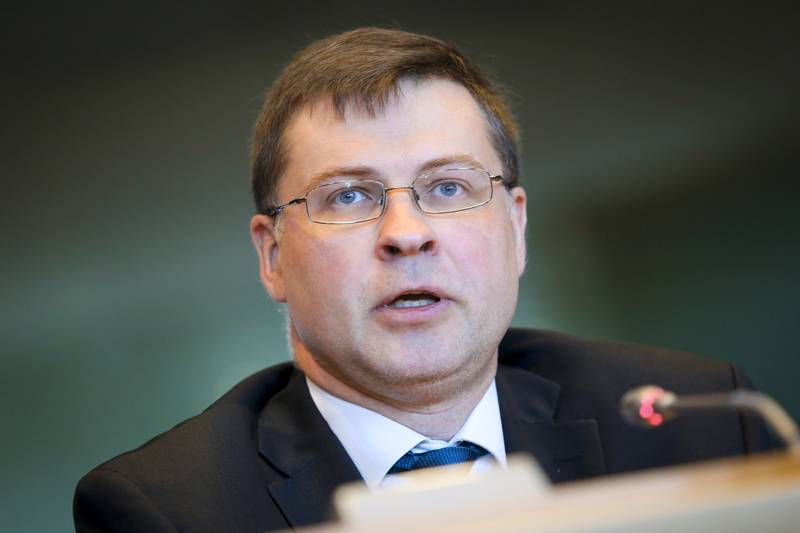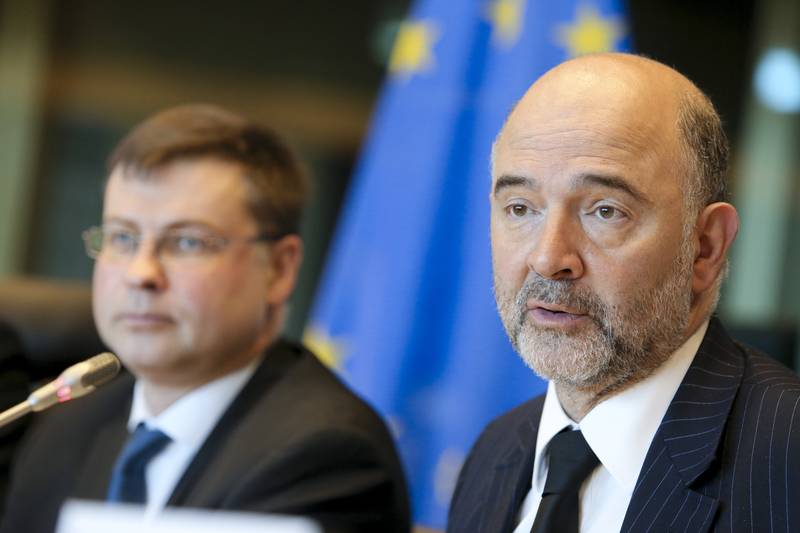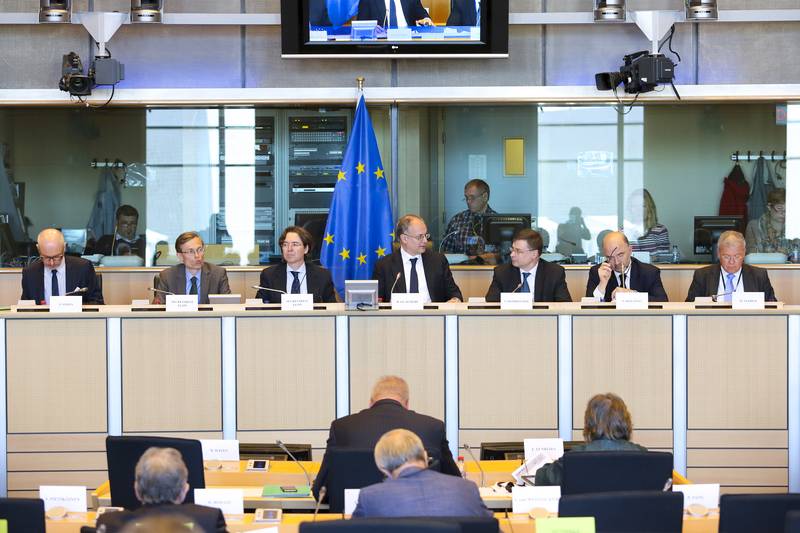A Threat of Sanctions Hangs over France and Croatia
Adelina Marini, April 16, 2015
 The European Commission will decide in May whether to punish France and Croatia. The decision will depend on whether the national reforms programmes the two countries will present will be sufficient to overcome their excessive imbalances. This will happen after the presentation of the spring economic forecast which will play a crucial role in deciding to trigger the so called "corrective arm" of the macroeconomic imbalances procedure. This is what Vice President Valdis Dombrovskis, who is responsible for the future of the eurozone, and EU Economic and Finance Affairs Commissioner Pierre Moscovici said during their first hearing this year in the economic committee of the European Parliament. Croatia and France are together with Bulgaria, Italy and Portugal in the group of countries at the before last level of alert in the macroeconomic imbalances procedure. The latter three countries, however, should not worry. The Commission has for now decided to just monitor them.
The European Commission will decide in May whether to punish France and Croatia. The decision will depend on whether the national reforms programmes the two countries will present will be sufficient to overcome their excessive imbalances. This will happen after the presentation of the spring economic forecast which will play a crucial role in deciding to trigger the so called "corrective arm" of the macroeconomic imbalances procedure. This is what Vice President Valdis Dombrovskis, who is responsible for the future of the eurozone, and EU Economic and Finance Affairs Commissioner Pierre Moscovici said during their first hearing this year in the economic committee of the European Parliament. Croatia and France are together with Bulgaria, Italy and Portugal in the group of countries at the before last level of alert in the macroeconomic imbalances procedure. The latter three countries, however, should not worry. The Commission has for now decided to just monitor them.
Of the three only Italy is at this alert level another year whereas Bulgaria and Portugal are there for the first time. Croatia and France are also a second year in a row at this stage. Quite expectedly France was a central issue during the one-hour and a half hearing in Brussels as several MEPs expressed doubts regarding the decision of the Commission, supported by the council of finance ministers (ECOFIN) France to be given another two years to correct its excessive budget deficit, as euinside wrote. It was a bit curious that Mr Pierre Moscovici (France, Socialists & Democrats) was the main speaker when it comes to France. He said that the economic and financial directorate of the European Commission, which makes the in-depth economic analyses and is independent, found no evidence that France had not met its commitments in the period 2013-2014.
Moreover, the indicators for 2014 proved much better than the forecasts of the previous Commission and Bank of France. It was clear, though, that the French government would not be able to meet its budget deficit targets of below 3% of GDP this year. According to Mr Moscovici, there were some serious disagreements between the Commission and the French government over the structural effort but the Commission insisted that effort to be 0.5% this year. Despite this disagreement, Moscovici assured that he is working very well with Paris. In spite of the assurances, however, many MEPs pointed out that the reasons for the decision on France were not sufficiently clear. This forced the French commissioner to reiterate time and again that the decision of the College of commissioners was taken unanimously. Furthermore, according to Mr Moscovici, the results show that it was a right decision not to rush with this decision back in November.
Markus Ferber (EPP, Germany) doubted the efficiency of the decision-making mechanism - the Commission makes an objective evaluation and later the Council makes a political decision. Another German MEP - Bernd Lucke (ECR) - also doubted the basis on which the decision to extend the deadline for correction of the French excessive budget deficit was taken. He recalled that France was allowed not to meet its targets for the third time. And according to the French liberal MEP Sylvie Goulard, Pierre Moscovici's explanations were a singing of fait accompli. She found odd the argument that since France's breach was inevitable it was allowed.
Croatia's case is different. The country has been in an excessive deficit procedure almost since its accession to the EU on 1 July 2013. Since then Zagreb has been trying to reduce it but to no avail. In its in-depth analysis of Croatia's economic situation the European Commission points out that "in a context of subdued growth, delayed restructuring of firms and dismal performance of employment, risks related to weak competitiveness, large external liabilities and rising public debt coupled with weak public sector governance, have significantly increased". Deputy Prime Minister Branko Grcic was in Brussels on the day of the hearing in the economic committee and has reassured Croatian media that there would be no sanctions or pressure. He promised that in the coming 10 days measures to reduce spending will be developed and the national reforms programme will be sent in Brussels. According to him, the future measures would not affect the people who depend on the budget.
Enough with these structural reforms!
 For the first time this year all the 28 EU member states are expected to score positive growth, although this is not certain for Greece given the current situation, said Valdis Dombrovskis. He was not very convincing, however, in his response to Sylvie Goulard's question whether the Commission shares Mario Draghi's assessment of the situation in the euro area. It was not quite clear what the French MEP from the Liberal group (ALDE) exactly meant but after the meeting of the ECB Governing Council a day (15 April) after the hearing Mr Draghi recalled something he has been saying every time in the past year, which is that the eurozone's economic recovery will continue to be subdued by the necessary adjustments in many sectors and by the slow pace of implementation of structural reforms. According to Mario Draghi, reforms are needed of the labour and product markets and also improvements of the business environment. In addition, the complete and consistent compliance with the fiscal rules is also very important. The ECB chief added that it is crucial the macroeconomic procedure to be applied efficiently which was obviously a warning to the Commission.
For the first time this year all the 28 EU member states are expected to score positive growth, although this is not certain for Greece given the current situation, said Valdis Dombrovskis. He was not very convincing, however, in his response to Sylvie Goulard's question whether the Commission shares Mario Draghi's assessment of the situation in the euro area. It was not quite clear what the French MEP from the Liberal group (ALDE) exactly meant but after the meeting of the ECB Governing Council a day (15 April) after the hearing Mr Draghi recalled something he has been saying every time in the past year, which is that the eurozone's economic recovery will continue to be subdued by the necessary adjustments in many sectors and by the slow pace of implementation of structural reforms. According to Mario Draghi, reforms are needed of the labour and product markets and also improvements of the business environment. In addition, the complete and consistent compliance with the fiscal rules is also very important. The ECB chief added that it is crucial the macroeconomic procedure to be applied efficiently which was obviously a warning to the Commission.
The implementation of the country-specific recommendations under the macroeconomic imbalances procedure is one of the biggest problems of the European Semester since it entered into force 4 years ago. Mr Valdis Dombrovskis said that "some progress" has been noted in the implementation of 42% of the 2013 country-specific recommendations. In only 8% of the recommendations has been noted "substantial progress" whereas there is full implementation of only 2%. The implementation is "limited" for 36% of the recommendations and none for 12% of them. And although structural reforms are a key to the economic recovery to Mario Draghi and to the Commission this is one of the three pillars of this year's growth survey (together with investments and fiscal consolidation), Elisa Ferreira (Portugal, Socialists & Democrats) called on the Commission to reconsider the concept of structural reforms.
Moreover, she demanded the term to be replaced by something else because there is overuse which causes political problems. The moment is ripe to think about a change of the system so that the country-specific recommendations can cover the judiciary systems, modernisation of administration, education, etc. However, these recommendations should come from the member states in a close dialogue with the Commission and not vice versa, the left Portuguese MEP said. Mr Dombrovskis recalled, however, that the recommendations already cover all these areas and that precisely with the aim to enhance the dialogue with the member states the presentation of the in-depth analyses was 3 months earlier. Valdis Dombrovskis concluded that the compliance with the rules is crucial for the confidence in the EU and especially in the euro area.
Only two phases for the future of the euro area
 During the hearing, former Latvian prime minister Dombrovskis said that the second report of the four presidents about the future of the euro area will consist of two phases. This report is being currently developed by the chiefs of the Commission, ECB, the Eurogroup and the European Council - Jean-Claude Juncker, Mario Draghi, Jeroen Dijsselbloem and Donald Tusk - and is expected to be presented at the June EU summit. In February, Jean-Claude Juncker presented the introduction of the report which was an analysis of the reasons behind the eurozone sovereign debt crisis. In June, it is expected to be seen what will the vision of the four presidents be for the future of the monetary union. According to Mr Dombrovskis, this vision will be divided in two stages. The first is what can be done now and in the framework of the existing treaties. The second stage will be the longer term which includes the possibility of treaty changes.
During the hearing, former Latvian prime minister Dombrovskis said that the second report of the four presidents about the future of the euro area will consist of two phases. This report is being currently developed by the chiefs of the Commission, ECB, the Eurogroup and the European Council - Jean-Claude Juncker, Mario Draghi, Jeroen Dijsselbloem and Donald Tusk - and is expected to be presented at the June EU summit. In February, Jean-Claude Juncker presented the introduction of the report which was an analysis of the reasons behind the eurozone sovereign debt crisis. In June, it is expected to be seen what will the vision of the four presidents be for the future of the monetary union. According to Mr Dombrovskis, this vision will be divided in two stages. The first is what can be done now and in the framework of the existing treaties. The second stage will be the longer term which includes the possibility of treaty changes.
The first report of the four presidents, of whom only one is new to the group - the European Council President Donald Tusk - envisaged a deepening of the Economic and Monetary Union in three stages but the first is already complete. It included completion of the repairs and upgrade of the EU economic governance (the European Semester) and completion of the banking union. According to the debates held so far, at this stage no new changes of the European Semester are needed but just strict implementation of what has been agreed. It is interesting to see what a vision the four presidents will present about the long term and what horizon the possible treaty changes will have.
 Klaus Regling | © Council of the EU
Klaus Regling | © Council of the EU Mario Centeno | © Council of the EU
Mario Centeno | © Council of the EU Mario Centeno | © Council of the EU
Mario Centeno | © Council of the EU